I really, really don’t like naps.
This might be an uncommon thing for a university student to say. I mean, sleep is great! It recharges you, is a great way to avoid studying under the guise of meeting your basic needs, and just feels so good. Studies have shown that being well-rested can decrease stress, increase reaction time and reasoning, and boost your memory… all things that we as students could use.
It’s like I’m looking at the world from the inside of a fish bowl, or through a TV screen.
But when I wake up from a nap, I don’t feel well rested. I don’t feel ready to take on that exam I’ve studied so hard for… at times, my memory will be so bad that I can’t even remember my own name. I feel groggy and depleted. I have trouble discerning whether I’ve actually really woken up at all, or if I’m still dreaming. It’s like I’m looking at the world from the inside of a fish bowl, or through a TV screen.
When this feeling is at its worst, it seems as though I’m floating above myself, disconnected from my own body, or like I’m watching someone else’s actions when they’re really my own. In this foggy, dizzying state, I can still interact with my surroundings… but afterwards, I can’t quite remember it happening. Things feel weird, like I’m falling out of touch with myself. As if there’s something invisible dividing me from the world.
These sensations might sound really, really strange to you. However, if you’ve ever experienced depersonalization, what I’ve described above might sound pretty familiar.
What is depersonalization?
Though a disorder known as depersonalization-derealization disorder exists, depersonalization itself is a symptom, not a disorder¹. This means that it is often a component of a larger issue, such as anxiety or PTSD.
Depersonalization refers to a dreamlike state, wherein one feels disconnected from their surroundings and experiences². Statistics show that depersonalization is the third most common symptom of mental illness, following depression and anxiety¹.
Though there is no exact cause for depersonalization, this symptom has been linked to traumatic experiences, PTSD and anxiety, as well as psychoactive substance use, including cannabis².
Art by Saskia Keultjes.
Mild or transient episodes of depersonalization, which might be described as “feeling out of it“, “zoning out“, or “awake but dreaming”, are common in many people: so common, in fact, that about 50% of the population has experienced an episode at one point or another in their lifetime⁴.
What does depersonalization feel like?
As I mentioned, feeling disconnected from the self, having the sensation of floating, persistent forgetfulness and memory issues, and feelings of unreality are all sub-symptoms of depersonalization. Other sub-symptoms include warping of time, issues with identity, feeling emotionally numb, and having difficulty processing and responding to intense emotions. These disconnected sensations may result in a person having issues with conflict, confrontation, and interpersonal communication during an episode.
Episodes can last a minutes, days, months, or years, depending on the person and the cause³. Severity ranges from feeling a bit foggy and disconnected, to feeling completely dreamlike and dislocated from reality³. As you can probably imagine, all of these sub-symptoms mean that experiencing depersonalization can feel pretty scary, especially if you’re not sure what’s going on.
What might trigger a depersonalization episode?
Much like a panic or anxiety attack, various triggers can lead to an episode of depersonalization. These triggers vary from brain to brain; they can be related to trauma, anxiety, stress, or substance use³.
For me, this symptom most often arises as a result of sensory overload. Excessive stress (such as finals season), social anxiety (like when I’m at a party with a lot of new people), too much screen time, or altered states (which is why I don’t do naps, and why I personally avoid substances like caffeine and cannabis) are all potential triggers. As a person who gets migraines, the aura I experience can mimic the sensations of depersonalization enough that it can trigger an episode. So I try my best to avoid under-sleeping, too much sun or heat, excessive sugar, and too much exposure to loud, bright spaces (not that I really need another reason to avoid these things! Migraines are bad enough on their own).
Art by Jenny Yu.
Sometimes, though, my triggers can’t — or even shouldn’t — be avoided. I love live music, but every time I go to a concert or festival, I risk triggering myself. Loud noises, flashing lights, tons of people — it’s a recipe for disaster. But… it’s also an opportunity for enrichment and experience. For me personally, it’s a risk I’m willing to take. Sometimes I’ll bring ear plugs to shows to help lower my risk of sensory overload; however, most of the time, it’s enough for me to prepare ahead of time by grounding myself and practicing mindfulness techniques.
Art by Ruby Elliot.
What can help?
As I mentioned above, what I’ve found to work really well for me personally is a combination of avoiding my triggers, self-grounding, and mindfulness techniques. Lots of resources for mindfulness, grounding, and self-soothing techniques are available online; some good ones can be found here, here, here, and here. If audio works better for you, or you’re trying to reduce screen-time, you can also try meditation-based apps like Headspace or Calm, or look up grounding exercises on Youtube.
It’s been really helpful for me to cultivate self-awareness. After paying close attention to my own body and experiences of depersonalization, I know what I feel like at the beginning of an episode. As soon as I start feeling a bit hazy and uncomfortable, I can do my best to change my surroundings and turn things around.
For me, being able to put a label to the experience was beyond helpful. Being able to tell myself that this is a common, known symptom, and that I am not alone, has had a huge impact on my understanding of and relationship with this symptom.
Another thing that has really impacted how I see depersonalization has been reframing it as not a force of evil, but as a protective mechanism. When depersonalizing, your body is trying to get you out of a scary, possibly harmful situation by internally distancing you from it. Seeing depersonalization as an automatic and protective coping strategy, rather than as an explicitly hurtful side-affect of my anxiety, has helped change the way and frequency at which I experience episodes.
This perspective has also helped me to cultivate more self-compassion. Depersonalizing is how my mind has done its best to try to protect itself with the tools it’s had available. Despite how unpleasant and scary the symptom can be, I respect and am grateful that my mind is trying to keep me safe.
In learning how to process and cope with my depersonalization and other aspects of my anxiety, being open and honest with friends and talking to a counsellor have both been so important. If you’re coping with any debilitating or uncomfortable mental health symptoms, whether that’s depersonalization, anxiety, or otherwise, you don’t have to do this alone.
When depersonalizing, your body is trying to get you out of a scary, possibly harmful situation by internally distancing you from it.
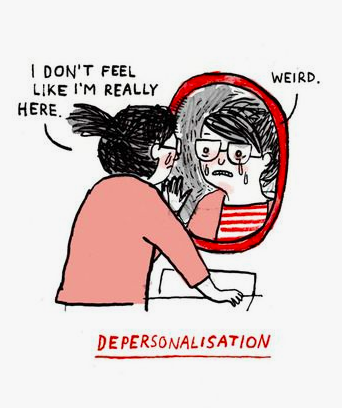
Art by Gemma Correll.
Helpful Resources
If you’re a psych nerd like I am, and would like to learn more about depersonalization:
- A neat slideshow with some info on the symptom of depersonalization.
- An article on experiencing depersonalization as a symptom of anxiety.
- An informative video on depersonalization-derealization disorder.
- A great book on depersonalization-derealization disorder.
Or if you’re looking for support on-campus:
- UVic Counselling Services offers professional, free counselling support for UVic students.
- UVic Health Services offers drop-in and appointment-based psychiatric care.
- The Peer Support Centre is run by students and offers one-on-one discussion in a safe, welcoming and open environment.
As always, thanks so much for reading!
– Cassidy
The views expressed in this blog are my own, and do not necessarily reflect the policies or views of the University of Victoria. I monitor posts and comments to ensure all content complies with the University of Victoria Guidelines on Blogging.
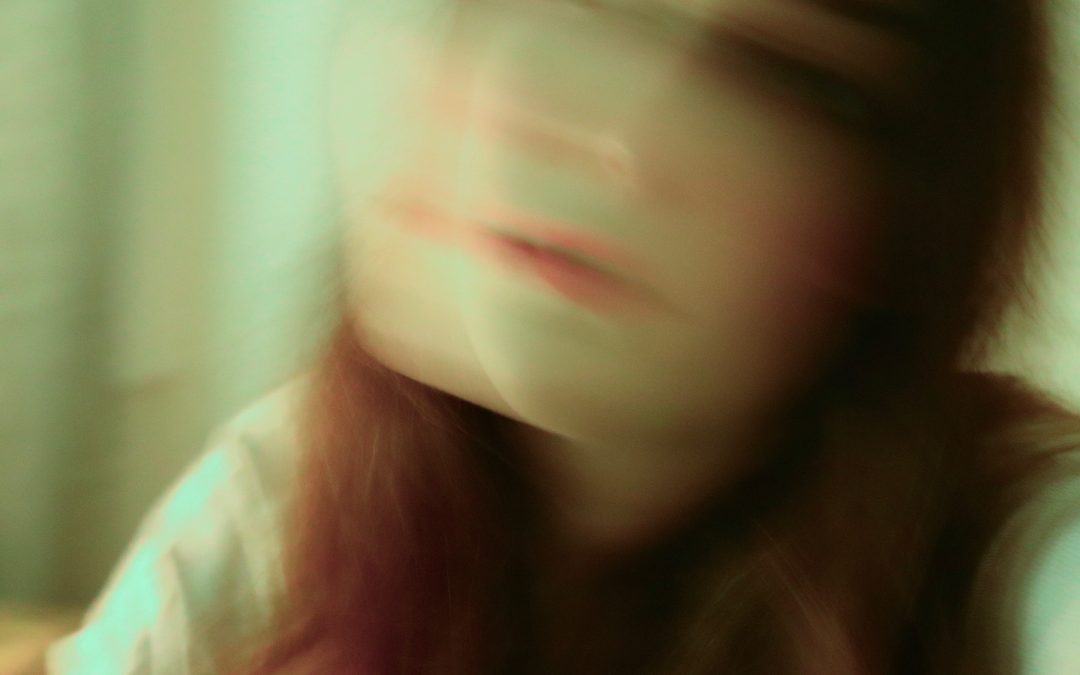
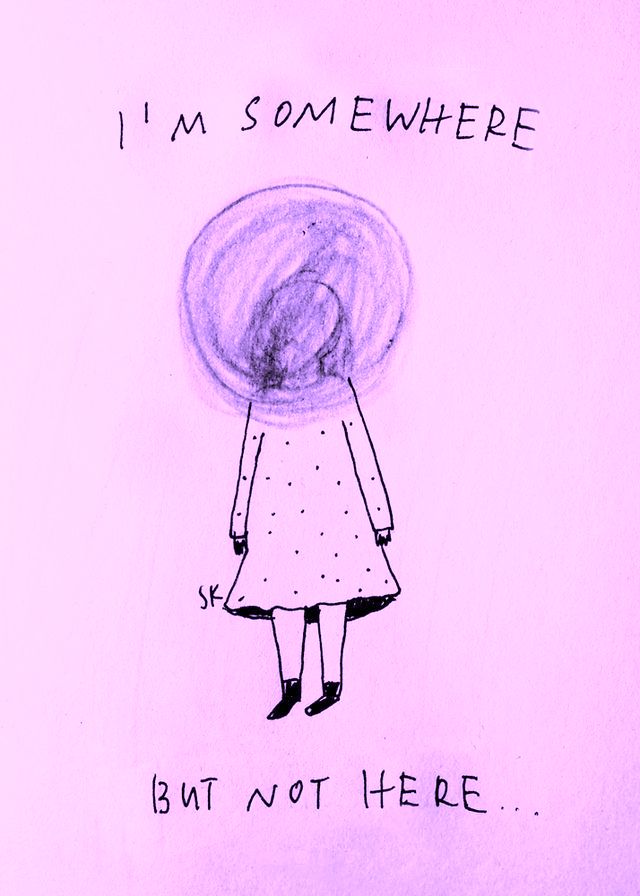
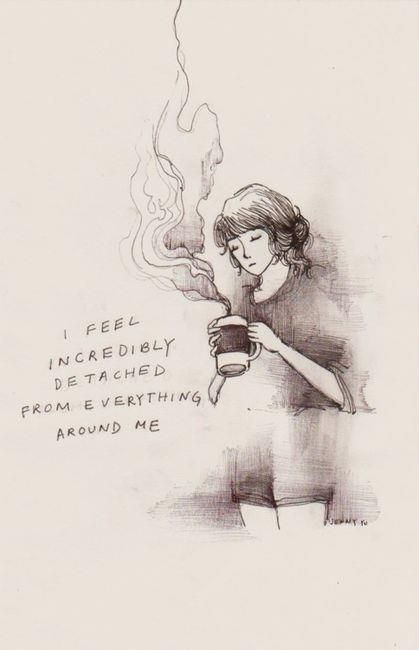
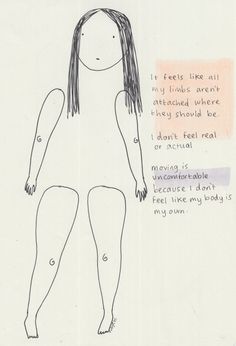
buspar 50 mg
https://www.hydroxychloroquinex.com/ order aralen online
where to get hydroxychloroquine otc
I thought that I was the only one experiencing this, and simply couldn’t fully explain it to anybody else. Thank you alot for this article, it has been helpful.
This is an amazing resource that has taught me about myself! I’m a therapist and I will be showing this to my clients as well!
Thank you for this! I’m be been feeling this way for a couple days and feels like when my migraines start and spots and auras begin to appear but the severe headache and blindness hasn’t happened yet. Thank goodness! I will treat the same way i would an oncoming migraine and hope it works. Thank you!
Thank you for sharing.
Thank you Writer, you have help me to express my depersonalization feelings.
Thank you so much Elijah. Be well!
I don’t know if anybody will read this, disclaimer; I’m bad with writing.
Thank you so much. I know that me and thousands of over humans are in pain and this article was beyond helpful. I cannot thank the writer enough. From human to human